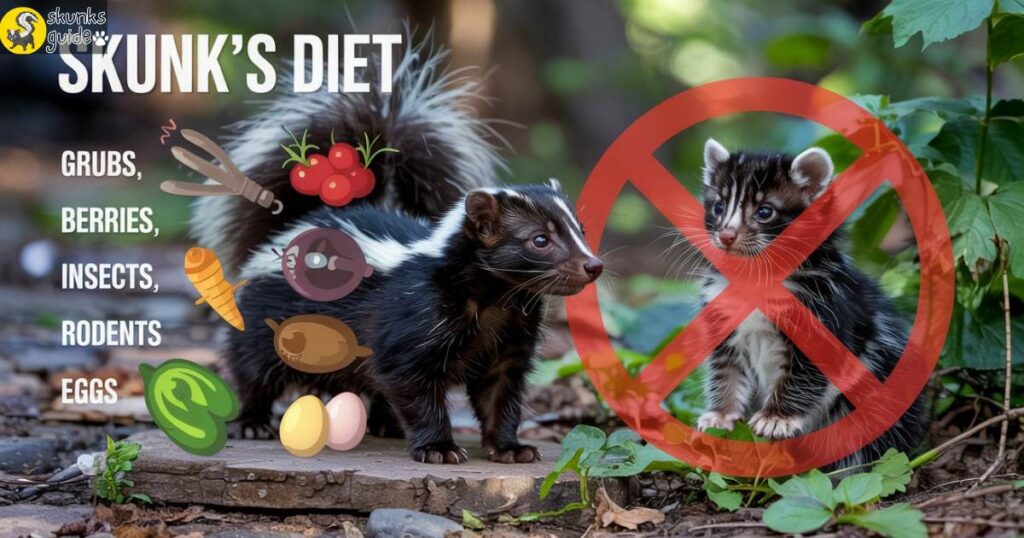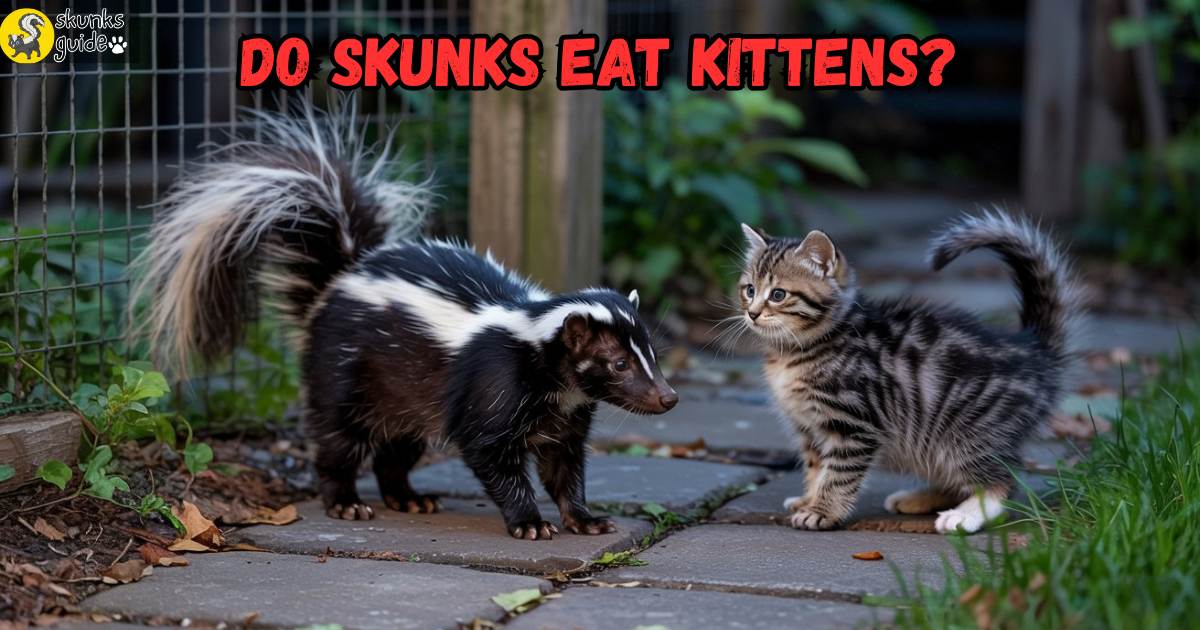Do Skunks Eat Kittens?
Last updated on June 28th, 2025 at 02:04 am
You hear a rustle in your backyard at night and spot a skunk prowling near your new kitten’s favorite play area. Your heart races: do skunks eat kittens? The short answer is no, skunks do not typically eat kittens. Skunks are omnivores that prefer insects, small rodents, and plants, but they may pose other risks to kittens, like spraying or rare defensive bites, especially at night when skunks are active. In this guide, we’ll debunk myths like “skunks eat kittens,” explore skunk behavior, and share practical tips to keep your kitten safe. Whether you’re worried about “can skunks eat kittens” or “will a skunk eat kittens,” we’ll clarify the facts and help you protect your furry friend from skunk encounters.
What Do Skunks Eat? Understanding Their Diet

Skunks are opportunistic omnivores with a varied diet that includes insects (like beetles and grubs), small rodents (such as mice or voles), fruits, vegetables, eggs, and occasionally small birds. According to wildlife expert James Don from Skunks Guide, skunks prefer easily accessible food sources over challenging prey. This means can skunks eat kittens? Technically, they’re capable of eating small animals, but kittens are not a typical food source due to their size and skunks’ preference for smaller, less defensive prey. Picture a skunk digging through your backyard for grubs or scavenging fallen berries—it’s far more interested in these than your kitten. The American Veterinary Medical Association notes that skunks are scavengers, not hunters of larger mammals, so myths about “skunks eat kittens” are largely unfounded.
Do Skunks Pose a Threat to Kittens?
So, do skunks eat kittens? No, skunks do not eat kittens, and this includes queries like “will a skunk eat kittens” or “do skunks eat kittens at night.” Skunks focus on smaller, easier prey like insects or rodents, not mammals as large as kittens. However, skunks can pose other risks:
- Do Skunks Eat Kittens at Night?: Skunks are nocturnal, making nighttime encounters more likely, but they’re still unlikely to eat or attack kittens. Their primary defense is spraying, not hunting.
- Can Skunks Eat Kittens?: While skunks have the physical ability to eat small animals, kittens are too large and not part of their natural diet.
- Are Skunks Dangerous to Kittens?: Skunks are generally non-aggressive and avoid confrontation. However, if a kitten corners a skunk, it may spray or, in rare cases, bite, potentially transmitting diseases like rabies (though this is uncommon, per the CDC).
- Skunk and Kitten Interactions: Skunks and kittens may coexist peacefully in yards, but close encounters should be avoided to prevent spraying or stress.
Unlike true predators like coyotes or hawks, skunks are not a significant threat to kittens as prey. Their behavior is more about scavenging than hunting.
Risks Skunks Pose to Kittens (and How to Mitigate Them)
While skunks don’t eat kittens, they can still pose risks, especially during nighttime encounters when skunks are most active. Here are the main concerns and how to address them:
- Skunk Spray: Skunk spray can irritate a kitten’s eyes, skin, or respiratory system, causing discomfort or temporary distress. Kittens are particularly sensitive due to their small size.
- Bites or Scratches: If a skunk feels threatened, it may bite or scratch, though this is rare. Bites could carry health risks like rabies, but the AVMA notes that rabies in skunks is less common than in other wildlife like raccoons.
- Competition for Food: Skunks are attracted to cat food left outdoors, increasing the chance of encounters in your yard.
Mitigation Tips:
- Keep kittens indoors, especially at night, to address concerns like “do skunks eat kittens at night.”
- Remove outdoor food sources, such as cat food or unsecured trash, to avoid attracting skunks.
- Use motion-activated lights or sprinklers to deter skunks from your yard.
- James Don from Skunks Guide recommends sealing entry points under decks or sheds where skunks may nest, reducing the risk of encounters.
By taking these precautions, you can minimize any risks to your kitten.
How to Protect Your Kitten from Skunks

Protecting your kitten from skunks is straightforward with these practical steps:
- Supervise or Enclose Kittens: Keep kittens indoors, especially at night when skunks are active. If they must go outside, use a secure, enclosed area like a catio to prevent wandering.
- Remove Attractants: Secure trash cans with tight lids and remove pet food from your yard to avoid drawing skunks.
- Install Barriers: Use fencing or chicken wire to block skunk access to your yard or under structures like porches.
- Use Natural Deterrents: Place citrus peels or ammonia-soaked rags (in pet-safe areas) to repel skunks, as they dislike strong smells.
- Check for Skunk Signs: Look for burrows, tracks, or a strong odor in your yard. If you suspect skunks, contact a wildlife professional for safe removal.
If a skunk sprays your kitten, rinse immediately with a vet-approved solution (e.g., 1 quart 3% hydrogen peroxide, ¼ cup baking soda, 1 tsp dish soap) and avoid vinegar, as it may irritate a kitten’s sensitive skin. Consult a veterinarian if your kitten is sprayed, bitten, or shows signs of distress, such as excessive scratching or lethargy. These steps ensure your kitten stays safe from skunk-related risks.
Frequently Asked Questions
No, skunks are unlikely to eat kittens at night or any time. They prefer smaller prey like insects or rodents and are more likely to spray if threatened.
Rinse with a vet-approved solution (e.g., hydrogen peroxide, baking soda, dish soap) and consult a vet for irritation or health concerns.
Conclusion
Contrary to myths, skunks eat kittens is not a reality—skunks do not typically eat kittens, whether at night or during the day. Their diet focuses on insects, small rodents, and plants, not larger mammals like kittens. However, skunks can pose risks like spraying or, in rare cases, biting, which could affect your kitten’s health. By keeping kittens indoors, removing food attractants, and using deterrents like motion-activated lights, you can prevent skunk encounters. For more pet safety tips, check out resources like Skunks Guide or consult your veterinarian to keep your kitten safe and happy.
{
"@context": "https://schema.org",
"@type": "Article",
"headline": "Do Skunks Eat Kittens? Separating Fact from Fiction",
"description": "Learn the truth about skunk behavior, whether skunks eat kittens, and how to protect your pet from skunks at night.",
"author": {
"@type": "Person",
"name": "Robert Jones"
},
"datePublished": "2025-06-28",
"image": "http://skunksguide.com/wp-content/uploads/2024/05/do-skunks-eat-kittens.jpg"
}

